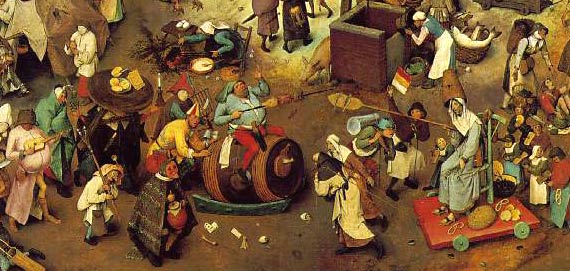What God has made clean, do not call unclean. ~ Acts 10:15
I used to have a job in a Catholic Charities group home, much of which involved changing the soiled sheets and menstrual pads of severely mentally challenged young women.
At the time, I didn’t realize what an opportunity for spiritual growth I was experiencing. Cutting my children’s umbilical cords, changing their diapers, giving Communion to a woman hours before her death, laying hands on the dying and praying with them, dabbling Communion wine on the lips of the comatose, baptizing a tiny newborn with his intestines wrapped up in a plastic bag on the bed next to him—these have constituted many of the most profoundly “spiritual” moments of my life.
And if I ran the zoo, Andres Serrano’s infamous Piss Christ photograph—featuring a plastic crucifix submerged in the photographer’s blood and urine—would hang in the break room of every Christian group home, hospital and hospice, because it is in the blood and sewage that we find Jesus.
I think there is a unique value in service one finds personally distasteful. The great French mystic Brother Lawrence of the Resurrection spent the cloistered part of his life working in the monastery kitchen, a job he especially disliked. And one of St. Francis of Assisi’s first acts after his conversion was kissing a leper—a class of people for whom he’d always had a particular horror and disgust.
In his commentary on the Tantraloka, Jayaratha (1150-1200 CE) explains that would-be initiates into Tantra of the Kashmir Shaivites must use objects and ingest substances “detested by people, prohibited by the sacred texts, disgusting and despised.” Those who wish to enter the Kashmiri Tantra must become familiar, even comfortable, with what is “inauspicious and illicit.”[i] Squeamishness won’t cut it.
The Kashmiri Tantra used these extreme methods for two reasons: 1) to transgress religious boundaries and mores in order to transcend them and 2) to wean aspirants away from the duality of attraction and repulsion. “[P]ractitioners (who) wish to express and develop the non-dual state…which does not oppose pleasure and horror…make use of both pleasure and horror and by these means show that they transcend all dualism.”[ii]
The further one progressed in the mysteries of the Kashmiri Tantra, the more one transgressed every imaginable social and religious boundary. If the aspirants made it as far as the kula ceremony, they would drink from a cup containing a dozen items, all of them repellant to Hindus, and many of them repellant to everybody: wine, semen, urine, menstrual blood, feces, phlegm, human flesh, beef, goat meat, fish, fowl, onion and garlic.[iii] (The last two are considered “brain poison for meditators,” but no one can convince me that Francis of Assisi, Teresa of Avila, St. John of the Cross, Catherine of Genoa and Brother Lawrence didn’t eat plenty of garlic.) It is hard to imagine a more daunting exercise in sublimating the sense of aversion in the name of equanimity, non-dualism and non-attachment.
When male initiates took part in the maithuna ceremony—the ritual sexual intercourse that is the basis for the “Tantric sex” which is about all the West knows, or thinks it knows, about Tantra—Abhinavagupta recommended in the Tantraloka that they perform the act with adulterous women, whose “husbands are an out-caste, a black, an archer, a butcher, a tanner, a eunuch, a fisherman, a potter”—those on the lowest rungs of the Hindu social ladder. The Kashmiri Shaivites “attach no importance to classes and conditions but on the contrary take pleasure in befriending the wretched and the dishonest.”[iv]
As a Christian, I respect that.
While Jesus was having dinner at Matthew’s house, many tax collectors and sinners came and ate with him and his disciples. When the Pharisees saw this, they asked his disciples, “Why does your teacher eat with tax collectors and sinners?” On hearing this, Jesus said, “It is not the healthy who need a doctor, but the sick. But go and learn what this means: ‘I desire mercy, not sacrifice.’ For I have not come to call the righteous, but sinners.”[v]
I thought of this passage when I read, in Autobiography of a Yogi, Swami Yogananda’s account of his first meeting with Swami Dayananda, who explained that he had had neither food nor drink during the preceding four days of travel because “I never eat on trains, filled with the heterogeneous vibrations of worldly people.”
To the notion that other people’s worldly vibes might get into one’s food and give one spiritual cooties, Jesus might have answered, “What goes into someone’s mouth does not defile them, but what comes out of their mouth, that is what defiles them.”[vi]
Ever since the Apostolic Era—when Jesus’ first disciples were still alive—Christian doctrine has held that all foods are clean. “If you enter a town and it welcomes you,” Jesus told his disciples, “eat whatever is set before you” without any scruples based in Jewish dietary law.[vii] Whether dealing with forbidden foods, social outcastes (foreigners and tax collectors), or physical illness of a type that would defile a Jewish man who came in contact with it (lepers and the woman with vaginal bleeding,) Jesus, like a good Tantrika, is “the one who does not recoil from anything.”[viii]
So while vegetarianism is not unheard-of among Christians—the Trappist monks have been vegetarians since the 17th century, as were the desert hermits of the Roman era—it is not exactly mainstream.
I’ve been a vegetarian since 1987—a little more that half my lifetime ago. I have neither knowingly cooked nor eaten meat in all that time. This is unusual for a Christian, and I have taken some heat for it from Christians more conservative than myself, who claim, essentially, that my vegetarianism reintroduces squeamishness into an area to which Jesus Himself had given the all-clear.
At my Episcopalian parish (where nobody judges my vegetarianism so far as I know) bacon holds a position just slightly below Holy Communion, and its great Feast Day is Shrove Tuesday, when it shares the spotlight with live Dixieland Jazz, sausage, coffee, Mardi Gras beads and, of course, mountains of pancakes. In our parish, this annual pre-Lenten blowout is a fundraiser in support of the youth Sunday school’s pilgrimage to Pine Ridge, South Dakota, and as one of their teachers, I roll up my sleeves and pitch in to help out. Long before the hungry parishioners pour into the hall to drop money in the baskets and load their plates with sweet, fatty, festive food, I station myself by the big double sink to wash the baking trays the bacon is cooked on, preparing them for the next batch in the production line of sizzling pork belly.
I’ve been a vegetarian so long that I avert my eyes when passing the butcher’s counter in the grocery store; as a child, I’d have seen food behind the glass, but now I only see dead flesh. So twice a year (we also bacon-out on our parish patron St. Martin’s feast day) I set myself the little Christian Tantric spiritual exercise of rolling up my sleeves and washing seared pig bits off a bunch of baking pans, and going home smelling like hickory smoked lard. Of course it’s a small thing, and mostly symbolic; I’ve done it often enough by this point that I scarcely have any aversion left to overcome. But we have to take our spiritual vitamins on the run; even if we had more time for formal spiritual practice, we probably wouldn’t use it, and if you spend a lot of time in the kitchen, the kitchen is as good a place as any to practice in. St. Teresa of Avila put it this way:
“Don’t think that if you had a great deal of time you would spend more of it in prayer. Get rid of that idea! God gives more in a moment than in a long period of time, for His actions are not measured by time at all. Know that even when you are in the kitchen, Our Lord is moving among the pots and pans.”
[i] Dupuche, John. Towards a Christian Tantra: The Interplay of Christianity and Kashmir Shaivism
[ii] Dupuche
[iii] Dupuche
[iv] Dupuche
[v] Matthew 9:10-17
[vi] Matthew 15:11
[vii] Luke 10:18
[viii] Dupuche
Author: Scott Robinson
Editor: Travis May
Photo: video still












Read 1 comment and reply